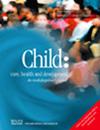Child and adolescent participation measurement tools and their translations: A systematic review
Abstract
Background
Numerous participation measurement tools targeting children and youth have been developed. Despite the translation of these tools into specific languages and cultures, the reliability and validity of the translated versions remain uncertain. To address this gap in knowledge, this study aims to identify tools for assessing the participation of children aged 5–18 years and to appraise the psychometric properties of their translated versions.
Methods
Four electronic databases were searched for peer-reviewed studies published in English. Preferred Reporting Items for Systematic Reviews guidelines was followed. Study titles and abstracts were screened by four independent reviewers. Data were extracted for both original and translated versions of eligible tools. Instrument quality assessments were performed using the Outcome Measures Rating Form Guidelines. Any discrepancies were resolved by consensus.
Results
Out of the 31 measurement tools examined, 18 tools had at least one translated version available, and among those original measurement tools, a total of 58 translated versions were identified. The most widely translated tool was the Physical Activity Questionnaire for Children (12 languages), and the most frequently translated language was Chinese (7 tools). Most translated versions verified internal consistency and content validity. Only three translated versions were verified inter-rater reliability, and seven translated versions were tested criterion validity with the gold standard tools assessing participation of children (e.g., accelerometer, Pediatric Evaluation of Disability Inventory and four 24-h recalls). None of the translated versions were tested for intra-rater reliability and responsiveness.
Conclusions
These findings can support the selection of psychometrically sound tools for children with disabilities, given their culture and language, and tool quality.

 求助内容:
求助内容: 应助结果提醒方式:
应助结果提醒方式:


